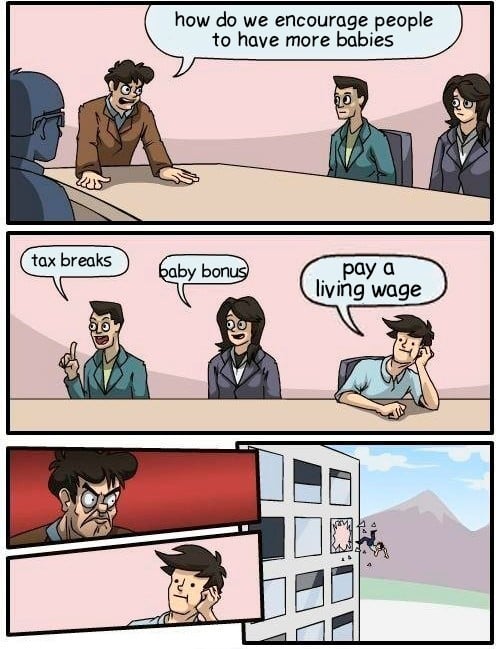this post was submitted on 29 Jul 2024
451 points (98.3% liked)
Political Humor
832 readers
1212 users here now
Welcome to Political Humor!
Rules:
- Be excellent to each other.
- No harassment.
- No sexism, racism or bigotry.
- All arguments should be made in good faith.
- No misinformation. Be prepared to back up your factual claims with evidence.
- All posts should relate to politics and be of a humorous nature.
- No bots, spam or self-promotion.
- If you want to run a bot, ask first.
- Site wide rules apply.
- Have fun.
founded 2 years ago
MODERATORS
you are viewing a single comment's thread
view the rest of the comments
view the rest of the comments

I don’t know if this really applies here. While lack of a living wage blocks many choices in life, is there anything specific for kids?
If you want more kids (and we do), you need to make those choices easier.
I know that’s more complicated than simply a living wage, but we’ve built a society that makes children more difficult, in many ways. If we want to encourage kids, we need to stop doing that
As a new father myself, enjoying a long 6w long paid leave, can't help but to think S W E D E N, S W E D E N, S W E D E N. With that said, I definitely agree. We didn't have to consider any of those points as we decided to have our child, only if we as individuals were ready.
Why do we want more kids? Obviously we need some, but why is a population decline a bad thing?
Look at Korea, look at Japan. Look at China. Low birth rates can easily get “stuck” at low rates by social and generational inertia. You can’t just tell people to have more kids but it can take generations to change habits. Think of it like melting ice sheets: by the time the problem is apparent, it may be a tipping point where you just can’t recover. It will be informative to see what happens to China especially. They very rapidly went from the most populated country to stabilizing, and soon to drop, potentially quickly. It’s done a great job of bringing its citizens into the modern era very quickly but part of that was based on immense labor advantage. What happens when they don’t have cheap labor, when retiring people suddenly outnumber workers, when they don’t have enough children to keep schools open, when they can’t afford the infrastructure built to support a billion people? Picture Detroit, but at the scale of China. Detroit is finally recovering but it took a long time to get this far
It’s easy to argue that a smaller population would be better, especially in some of the more crowded or overtaxed regions, but a suddenly smaller or much smaller would clearly not be. For me, I’m afraid of economic disruption leading to misery and violence. But most of all I’m afraid of losing humanity’s future. Science, technology, innovation, arts, are all positive values that accelerate with larger populations. We don’t want to drop far enough or fast enough to lose those. We don’t want to be stuck in stagnation and never figuratively grow
US, specifically, has room and resources for many more people. Aside from our profligate resource usage, we can have more, in contrast with more crowded populations that are already beyond local carrying capacity.